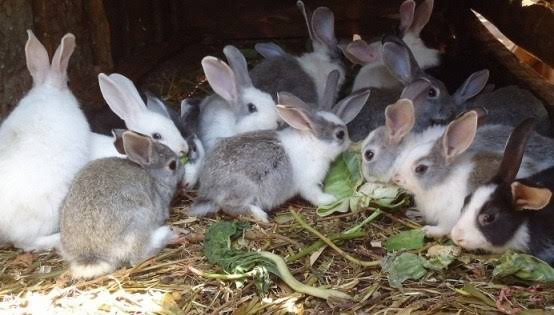
Rabbit meat is a slowly growing part of Africa’s diet, with a burgeoning industry in South Africa and Nigeria, and a group of hardcore rabbit farmers promoting the meat as cheap, healthy and environmentally friendly. But will it take off? Critics say they’re reluctant to eat animals that are considered pets.
Could rabbit be the new white meat for Africa?
African farmers are looking for a new solution for the continent’s growing appetite for meat. Africa’s population is set to nearly double in the next three decades, to 2.5 billion. The answer to those many, many new mouths to feed, they say, could lie with the humble bunny.
In the past decade, South Africa’s largest rabbit meat supplier has added nearly 150 rabbit farms to its stable. And breeders recently created a South African breed, the Phendula, which translates to “the answer.”
Independent farmer Gavin Grgurin keeps 500 rabbits at his farm outside Johannesburg. He says he thinks it’s the meat of the future.
“As National Council, we’ve been saying for the last 12- to 15-odd years that rabbit is the potential of being the savior of Africa from a protein point of view. The reasons beyond that all are a multitude,” Grgurin said.
For one, he says, rabbit meat is high in protein and low in fat and cholesterol. They take up little space and don’t eat much.
They require less water than chickens, and put out less waste than cows. Rabbits, Grgurin says, may be the greenest meat.
“There’s a lot of negatives that are currently happening around carbon impact on the planet, specifically around feed-lotting of animals on a large scale. We talk about cattle and beef that are put into feedlots. So you get huge carbon footprints there. Rabbits’ carbon footprint is minimal compared to the rest,” Grgurin said.
And finally, he says, they breed, like, well … you get the idea.
But can they make the leap from pet to plate?
Sloane Meat Market manager Richard Letcher says he’s noticed South Africans’ appetite for meat is expanding to more unconventional options. His shop is one of the few in Johannesburg that stocks rabbit, but it’s still moving quite slowly.
“What has changed within our environment over the last year is there’s been a lot more of our requests for goat meat which we haven’t sold before,” Letcher said.
He reasons that rabbit, which is still slow moving, could see the same growth.
But has he taken the bite? He cited the single biggest reason people give for not eating rabbit.
“I haven’t got my mind around eating my pet at this point, so, no,” Letcher said.
His colleague, meat cutter Mnelisi Smakade, says he’s missing out. He loves rabbit meat.
“It tastes like chicken. Sort of chicken. It’s not hard like the beef. It’s very nice and soft,” Smakade said.
As Africa’s population is set to nearly double by the year 2050, food supply — especially protein — is a major concern. Could the humble rabbit fill that gap — and millions of stomachs?
Source: VOA
You may be interested

‘It Was A Fair Result’ — Troost-Ekong Reacts To Super Eagles Stalemate Vs Benin Republic
Webby - November 15, 2024Super Eagles captain William Troost-Ekong claimed the Super Eagles deserved a point from their 2025 Africa Cup of Nations qualifying…
Dikko Vows Full NSC Support For Nigerian Teams’ Continental Success
Webby - November 15, 2024National Sports Commission (NSC) Chairman, Shehu Dikko, has pledged the Commission’s commitment to support all Nigerian sports teams competing on…

Super Eagles Goalkeeper Nwabali Loses Father
Webby - November 15, 2024Super Eagles goalkeeper, Stanley Nwabali, has lost his father.Nwabali announced the death of his father on Instagram on Friday, November…




















![American Pastor, David Wilson Seen Eating The Box Of Woman Who Isn’t His Wife [Video]](https://onlinenigeria.com/wp-content/uploads/2019/10/american-pastor-david-wilson-seen-eating-the-box-of-woman-who-isnt-his-wife-video-150x150.jpg)









